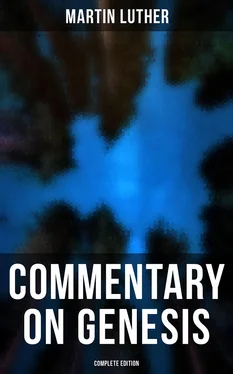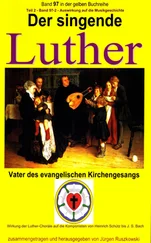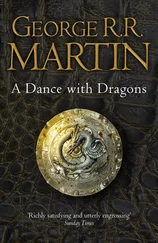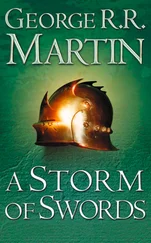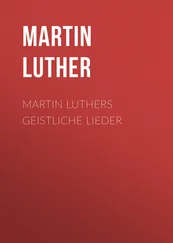Martin Luther - Commentary on Genesis (Complete Edition)
Здесь есть возможность читать онлайн «Martin Luther - Commentary on Genesis (Complete Edition)» — ознакомительный отрывок электронной книги совершенно бесплатно, а после прочтения отрывка купить полную версию. В некоторых случаях можно слушать аудио, скачать через торрент в формате fb2 и присутствует краткое содержание. Жанр: unrecognised, на английском языке. Описание произведения, (предисловие) а так же отзывы посетителей доступны на портале библиотеки ЛибКат.
- Название:Commentary on Genesis (Complete Edition)
- Автор:
- Жанр:
- Год:неизвестен
- ISBN:нет данных
- Рейтинг книги:4 / 5. Голосов: 1
-
Избранное:Добавить в избранное
- Отзывы:
-
Ваша оценка:
- 80
- 1
- 2
- 3
- 4
- 5
Commentary on Genesis (Complete Edition): краткое содержание, описание и аннотация
Предлагаем к чтению аннотацию, описание, краткое содержание или предисловие (зависит от того, что написал сам автор книги «Commentary on Genesis (Complete Edition)»). Если вы не нашли необходимую информацию о книге — напишите в комментариях, мы постараемся отыскать её.
Commentary on Genesis is the last work of Martin Luther, written during the last several years of his life. Luther's work follows the first volume of Psalms with critical and devotional remarks on the creation and on sin and the flood.
Commentary on Genesis (Complete Edition) — читать онлайн ознакомительный отрывок
Ниже представлен текст книги, разбитый по страницам. Система сохранения места последней прочитанной страницы, позволяет с удобством читать онлайн бесплатно книгу «Commentary on Genesis (Complete Edition)», без необходимости каждый раз заново искать на чём Вы остановились. Поставьте закладку, и сможете в любой момент перейти на страницу, на которой закончили чтение.
Интервал:
Закладка:
Most clearly therefore has Moses established the great truth, that "In the beginning was the Word," John 1:1. And as all creatures still increase and multiply, and are preserved and governed, still in the same way as they were "in the beginning," it manifestly follows that the Word still continues and lives, and that it is not dead! When Moses says therefore, "And God rested on the seventh day from the work which he had made," his words are not to be considered as having reference to the general course and laws of nature nor to their continuous preservation and government, but simply to the "beginning;" that God ceased from creating, ordering and ordaining all things, as we generally speak, and from creating any new creatures or new kinds of animals, etc., etc.
With respect to Martin Luther before you. If you look at my individual person I am a certain kind of new creature; because sixty years ago I had no existence. This is the common thought and judgment of the world. But the thought and judgment of God are far different. For in God's sight I was begotten and commenced, being multiplied immediately "from the beginning of the world." When God said, "Let us make man," he then created me also. For whatever God willed to create that he did create when he spoke the word. All things did not then appear indeed on a sudden before our existing eyes. For as the arrow or the ball from the cannon, in which is the greatest velocity attached to the works of men is in one moment directed to its mark, and yet does not reach that mark without a certain interval and space between, so God rushes, as it were by his Word, from "the beginning" to the end of the world. For with God there is no before nor afterwards; no swift nor slow; but all things to his eyes are at once present. For God is simply absolutely independent of and alone, and separate from all time!
These words of God therefore, and God said, "Let there be," "increase and multiply," etc., create, constitute and ordain all creatures, as they were, as they now are, and as they will be unto the end of the world. God has indeed ceased from creating new creatures. For he has created no new heaven, no new earth. But as he originally willed the sun and the moon to perform their courses, so have they continued to perform them to this day. As God then filled the sea with fishes, the heaven with fowls, and the earth with beasts and cattle, so have all these parts of his will been fulfilled to this day; and so have they all been preserved to this moment, as Christ said, "My Father worketh hitherto and I work." For the Word, which God spoke in the beginning, remaineth unto this day; as it is said with great majesty in Ps. 33:9, "He spake and they were made."
But here sceptics and objectors will present a further question for reply. How can it be true, say they, that God made no new thing, when it is evident that the bow of heaven or the rainbow was created in the time of Noah? And when also the Lord threatened after the fall of Adam, that it should come to pass that the earth should bring forth thorns and thistles? Which thorns and thistles the earth would not have brought forth had Adam not sinned. Also concerning the serpent, the same cavillers say, that reptile ought to creep along almost upright with its head bending toward the earth; for when first created they say it was doubtless upright, as crows and peacocks move now. We readily acknowledge that this is indeed a new state of things, wrought also by the Word.
It is moreover true that if Adam had not fallen by sin, there would not have been that ferocity in wolves, lions and bears, which now characterizes them. And most certainly also there would have been nothing in the whole creation noxious or annoying to man. For the text before us plainly declares that all things God had created were "very good." Whereas now, how numberless are the annoyances by which we are surrounded? To how many and how great distresses, especially of diseases, is the body itself subject? I will say nothing about fleas, flies, gnats, spiders, mosquitoes, etc. What a host of dangers threaten us continually from the greater ferocious and venomous beasts?
Although there had been none of these new or altered things after the creation, our sceptic objectors can surely believe that there was one glorious and marvellous "new thing," Is. 7:14, "that a virgin should bring forth a Son, the Son of God!" God therefore did not in the seventh day cease to work in every sense, but he works still, not only in preserving his whole creation, but also in altering and new-forming the creature; wherefore that which we said above, that God ceased on the seventh day from creating new orders of things is not to be understood as true absolutely and in every sense.
But we further reply to our cavillers that Moses is here speaking of nature in its yet uncorrupted state. If therefore man had stood unfallen in the innocency in which he was first created, no thorns nor thistles would have existed, no disease would have been known nor any violence of beasts feared. This is manifest from the case of Eve; she talks with the serpent without any fear whatever, and as we should do with an innocent little bird or with a favorite little dog. Nor have I any doubt that the serpent was an exquisitely beautiful creature and gifted with the peculiar excellency of having the highest praise for marvellous cunning, though then innocent cunning, even as foxes and weazels have that name among us now.
Wherefore when Adam was as yet holy and innocent, all the animals of the creation dwelt and associated with him in the highest pleasure, being prepared to render him every kind of service gladly. Nor would there have ever been known, if Adam had thus continued sinless, any fear of a flood, nor would there consequently have ever existed a rainbow in the heavens. But sin caused God to alter many things and otherwise order them. And at the last day there will be an alteration and a renewal far greater still of that whole creation, which as Paul says is now by reason of sin, "subject to vanity," Rom. 8:20.
Finally therefore, when Moses here says that "God rested on the seventh day," he is speaking with reference to the condition of the world, as originally created; meaning that while as yet there was no sin nothing new was created, that there were no thorns nor thistles, no serpents nor toads, and if there were such they possessed no venomous properties nor any inclination to harm. Moses speaks in this manner concerning the creation of the world, while yet in its state of perfection, unpolluted and unmarred by sin. It was then a world innocent and pure, because man was innocent and pure. But now, as man is no longer the same being, so the world is no longer the same world. Upon the fall of man followed corruption and upon this corruption the curse of the now corrupt creation. "Cursed is the ground," said God to Adam, "for thy sake! Thorns and thistles shall it bring forth unto thee!" Gen. 3:17, 18. Thus on account of one accursed Cain—sin, is the whole earth accursed! So that now even when tilled it does not put forth its original virtue. After this upon the sins of the whole world is poured the flood over the whole earth, and the human race throughout the whole world is destroyed, a few righteous persons only being saved lest the promise concerning Christ should fail of being fulfilled. And as it is manifest to us all that the earth is thus deformed by sin, so my belief is, as I have before said, that the light of the sun, when first created, and before the sin of Adam, was far more pure and more bright than it is now.
It is a common saying of divines in all theological schools, "Clearly distinguish times and you will harmonize all the Scriptures." Wherefore we must speak far otherwise concerning the world, under its present wretched corruption, by which it has been marred through the sin of Adam, than concerning the world when as yet it was in its state of original purity and perfection. Let us take an example still in our sight and knowledge. Those who have visited the "land of promise" in our day affirm, that there is nothing in it like unto that commendation of it which we have in the holy Scriptures. In confirmation of these statements a citizen of Stolberg, after having visited Palestine and surveyed with all possible diligence of observation, declared that he considered his own field in Germany a far more delightful spot. For on account of the sin, wickedness and ungodliness of men it is reduced to a positive pickle-tub, to "a salt land not inhabited;" so actually is the very essence of the curse of God upon it fulfilled, as it is said, Gen. 3:17, 18; Ps. 107:34. Thus Sodom also before it was destroyed by fire from heaven was a certain paradise, a garden of the Lord, Gen. 13:10. Thus does the curse of God generally follow sin, and that curse so changes things, that from the best they become the worst. Moses therefore, we repeat, is here speaking concerning the state of all creatures in their original perfection; as they were before the sin of man. For if man had not sinned, all beasts and every other creature would have remained in obedience to him until God should have translated him from paradise, or from earth to heaven. But after his sin, all things were changed for the worse.
Читать дальшеИнтервал:
Закладка:
Похожие книги на «Commentary on Genesis (Complete Edition)»
Представляем Вашему вниманию похожие книги на «Commentary on Genesis (Complete Edition)» списком для выбора. Мы отобрали схожую по названию и смыслу литературу в надежде предоставить читателям больше вариантов отыскать новые, интересные, ещё непрочитанные произведения.
Обсуждение, отзывы о книге «Commentary on Genesis (Complete Edition)» и просто собственные мнения читателей. Оставьте ваши комментарии, напишите, что Вы думаете о произведении, его смысле или главных героях. Укажите что конкретно понравилось, а что нет, и почему Вы так считаете.
